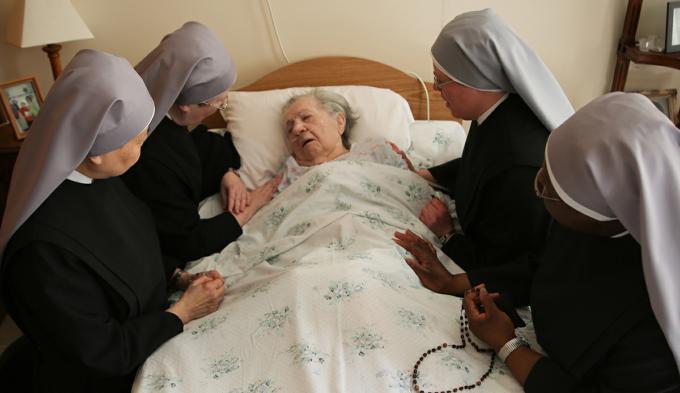
Spirituality
The practice seems a mystery, in the strict sense. It is not fully comprehensible by any utility or benefit.

Pakaluk
It is not quite one of the corporal acts of mercy. These include "visiting the sick," even if the illness is temporary or slight, and "burying the dead." True, by extension, burying the dead includes such things as visiting a grave on an anniversary, or planting flowers at the gravesite. By extension, visiting the sick would include, say, writing a letter or sending flowers to a sick person. But a special class altogether seems to be this kind of thing: some friend or relative is suffering a terminal illness; you receive word that he is failing rapidly and near to death; and therefore, you clear your schedule and visit him, so that you can "see him one last time." This seems a distinct work of mercy, "visiting the dying."
The practice seems a mystery, in the strict sense. It is not fully comprehensible by any utility or benefit. You've seen this person many times before: what difference does it make if you see him briefly one last time? You certainly won't help his illness. And the benefit to you, from doing a good deed, seems minimal. At least, the seriousness of the call we sense in conscience to "visit the dying" seems all out of proportion to the tangible benefits.
You have probably visited the dying yourself, and you have certainly seen it. In the month before my late wife, Ruth, passed away, friends from high school and from college, whom we hadn't seen for a decade, flew from various places across the country to see her. They traveled thousands of miles for a 15-minute visit. I remember the fact and the visits very clearly. You will have similar memories yourself.
Let me propose some reasons that begin to unfold why we do this -- why we consider it so important to visit the dying.
The first is that it's a substitute for being at someone's side when they pass. We would like to be there, to accompany them, but we can't. Perhaps some close family members are in a position to take days or weeks off from work in order to keep vigil. But most of us cannot. And so, we do what we can do. We are able to visit, say, a month beforehand, and then it's as if we remain virtually present with the dying person up to the point of death.
The second is to serve as a witness. We typically become "part" of what we witness. Consider a marriage: whether we remain close friends with a couple going forward in life or not, hinges on whether we cared enough to witness their marriage or not. If you were there, if you witnessed it, then you become "part" of their marriage bond henceforth. Similarly, if you witness someone's dying, then from their point of view, you are now "part" of this final experience and journey. And then, when the dying person offers up prayers, you become part of that offering. When the soul of that dying person (as we hope and pray) is brought to heaven, then you remain very close and "within" that person's joy.
A third reason is to express something about the preciousness of a single human life. In this respect, dying is like being born. We celebrate birthdays because we celebrate the existence and the life of the person whose birthday it is. To travel to be with someone on his birthday (we typically do so only for milestone birthdays, such as a 40th or 70th) is to say, "I esteem and love the mere fact that you are." Likewise, to be with someone as he is departing from life is to say that we esteem the life he has lived.
That is why the sacrifice to visit a dying person is important. A sacrifice is always a trade-off of this over that. In a trade-off, we declare that we value the thing we traded for more than the thing we traded away. If, for example, on Sunday I sacrifice compensated work so that I can worship God at leisure, spend time with my family, do services for the poor, and devote myself to sports and culture -- then, by this trade-off, I am saying that I value all of these other things more highly than the money I get from my compensated work. To the extent that it really costs you something -- taking time off from work and spending money on a plane ticket -- to that extent, you show the value of your dying friend's life above all else.
But the final and perhaps the most important reason for a Christian to visit a fellow Christian on his deathbed is to participate in the cross. Each Christian's deathbed is a Calvary. Yes, some of us die peacefully, as if falling asleep. But for others, it is not so, or in the preceding weeks, it was not so -- horrible disfigurations, wasting away, shaking with spasms, racked with pain. This is your friend, but now under the "distressing disguise" (as St. Mother Teresa would say) of the Face of Christ. We can flee from him as the Apostles did. We can distract ourselves and look away. Or, like John and the Holy Mother, we can stand there at the foot of our friend's cross, keep watch, contemplate, and share in the graces we believe God will pour out.
- Michael Pakaluk, an Aristotle scholar and Ordinarius of the Pontifical Academy of St. Thomas Aquinas, is a professor in the Busch School of Business at the Catholic University of America. He lives in Hyattsville, MD, with his wife Catherine, also a professor at the Busch School, and their eight children. His latest book is "Mary's Voice in the Gospel of John." You may follow him on X (twitter) @michael_pakaluk.
Comments
Comments Policy
Recent articles in the Spirituality section
-
Visiting the dying, a distinct work of mercyMichael Pakaluk
-
Pushed off the platformMichael Pakaluk
-
Advice to fathersMichael Pakaluk
-
The higher you go liturgically, the lower you should go in service of the poorBishop Robert Barron
-
The Easter Season is the fleshly seasonMichael Pakaluk


















